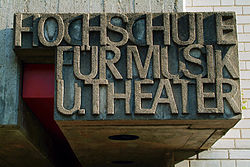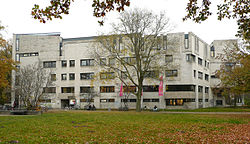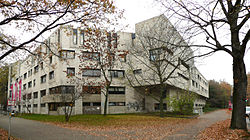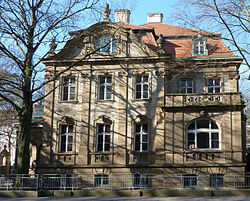- Hochschule für Musik, Theater und Medien Hannover
-
Hochschule für Musik, Theater und Medien Hannover 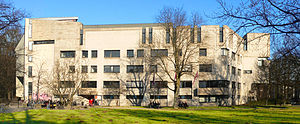
Hochschule für Musik, Theater und Medien HannoverEstablished 1897
1962Type Public President Susanne Rode-Breymann Admin. staff Approx. 350 Students Approx. 1400 Location Hanover, Lower Saxony, Germany Website www.hmtm-hannover.de 
Hochschule für Musik, Theater und Medien Hannover (University of Music, Drama and Media Hanover) (HMTMH) is an artistic-scientific university in Hanover, Lower Saxony, Germany. It dates back to 1897. From 1962 until 2010 it was named Staatliche Hochschule für Musik und Theater Hannover (State University of Music and Drama Hanover), short: Musikhochschule Hannover. Since 2010, the president has been Susanne Rode-Breymann. As of 2011, the university has approximately 1,400 students, taught by 350 teachers in 30 courses for musicians, actors, music teachers, musicologists and media scholars.
Contents
History
The university traces its history back to 1897, when a private "Conservatorium für Musik" (conservatory of music) began its operation. It was made the Konservatorium of the city in 1911. In 1943 the institution was named Landesmusikschule (State music school). The building was destroyed. In 1950, the Landesmusikschule was united with a private "Hannoversche Schauspielschule" (Hanover drama school) to form the Akademie für Musik und Theater (Academy of Music and Theatre).[1] In 1958 the school achieved the status of Hochschule and was organized as "Niedersächsische Hochschule für Musik und Theater" and "Niedersächsische Musikschule Hannover". In 1962 the two were united as the "Staatliche Hochschule für Musik und Theater" (HMTH, State University of Music and Drama Hanover).[1]
Between 1970 and 1973 the present main building was built at the Emmichplatz, bordering the park Eilenriede.[2] In 1973 the state Lower Saxony is responsible for the organisation of the Hochschule. In 1978 it received the status of an artistic-scientific university.[1] The European Centre for Jewish Music was established by Andor Izsák in the Villa Seligmann in 1988, which since 1992 has been an institute of HMTH. It deals with the documentation and reconstruction of Jewish liturgical music.[3] Since 2001 the university runs an institute for the early training of highly gifted students, the 'Institut zur Früh-Förderung Hochbegabter' (IFF, Institute for the Advancement of Young Musicians).[4] In 2010 the 'Institute of Chamber Music' and the 'Institute for Early Music' was founded. The name was extended by "Media".[4]
Architecture
The main building of the university is a structure in the shape of an ear, which is reflected in the logo. It was then one of the most modern buildings designed especially for the purpose of an artistic institution.[4]
In addition to the main site at the Emmichplatz, it has sites at the Villa Seligmann in Hohenzollernstraße (European Centre for Jewish Music), Schiffgraben, Bismarckstraße and the Expo Plaza, the site of the Expo 2000 (Acting course, Institute of Journalism and Communication Research).[4]
Courses
The HMTMH offers all of the standard classical courses of a university of music. The emphasis is on the areas of music education, artistic education, solo training, and theatre training. It also teaches jazz, rock, pop as part of a popular music program, with an emphasis on jazz.[5] The study programs in the areas of piano, orchestra and chamber music are particularly pronounced, especially in the artistic education and music education.
The drama and opera departments are in close cooperation with the Staatsoper Hannover, the Staatstheater Hannover and the NDR Radiophilharmonie. The university stages about two annual opera productions, including premieres, and about three orchestral concerts. The university also maintains artistic and scientific relations with several national and international music colleges and universities, including Switzerland, Eastern Europe and East Asia.[6]
Notable people
The university has had the following presidents:
- 1979-1993 Richard Jakoby (since 1968 as director of the predecessor institution)
- 1993-1997 Peter Becker
- 1997-2003 Klaus-Ernst Behne
- 2003-2005 Katja Schaefer
- 2006-2009 Rolf-Burkhard Klieme
- Since 2010 Susanne Rode-Breymann[7]
Lecturers
- Theo Altmeyer, voice
- Hans Christoph Becker-Foss, organ and early music studies
- Martin Brauß, piano
- Reinhard Febel, composition
- Jean-Claude Gérard, flute
- André Gertler, violin
- Heinz Hennig, choral conducting
- Karl-Heinz Kämmerling, piano
- Wilfried Köpke, journalism
- Alfred Koerppen, composition
- Ladislav Kupkovič, music theory
- Helmut Lachenmann, composition
- Diether de la Motte, music theory
- Nigel Osborne, composition
- Eiji Oue, conducting
- Ulrich Pothast, philosophy
- Felix Prohaska, conducting
- Matti Raekallio, piano
- Lajos Rovatkay, organ and early music studies
- Jean Soubeyran, acting
- Siegfried Strohbach, composition
- Raphael Thoene, composition
- Gerrit Zitterbart, piano
Students
Music
- Tokunbo Akinro, singer
- Elisabeth Brauß, pianist
- Francis Buchholz, bassist
- Ronald Cavaye, pianist
- Dantes Diwiak, singer
- Jörg Duda, composer
- Monika Frimmer, singer
- Daniel Gortler, pianist, composer
- Linda Heins, singer
- Kei Itoh, pianist
- Morten Klein, saxophonist, composer
- Jan Kobow, singer
- Giorgi Latsabidze, pianist
- Georges Lentz, composer
- Igor Levit, pianist
- Michail Lifits, pianist
- Dong-Min Lim, pianist
- Jun Märkl, conductor
- Dany Mann, jazz and pop singer, actress
- Cornelius Meister, conductor
- Wolfgang Meyer, clarinetist
- Sarah Nemtsov, oboist, composer
- Gustavo Núñez, bassoonist
- Gülsin Onay, pianist
- Francesco Piemontesi, pianist
- Ilya Rashkovsky, pianist
- Martin Sander, organist
- Thomas Schmidt-Kowalski, composer
- Wolfgang Schöne, singer
- Hanna Schwarz, singer
- Claudia Schwarze, cellist
- Rainer Seegers, percussionist
- Fumiko Shiraga, pianist
- Olga Virezoub, composer and pianist
- Lars Vogt, pianist
- Bettina Wulff, communication
- Li Yundi, pianist
Acting
- Dietrich Adam
- Ulrike Folkerts
- Alexandra Henkel
- Katja Riemann
- Brita Sommer
- Axel Schreiber
- Katharina Schüttler
- Arndt Schwering-Sohnrey
- Anke Sevenich
- Peter Thom
Journalism
Bettina Wulff, media manager
References
- ^ a b c "Chronik Chronik-1999-1897" (in German). hmtm-hannover.de. 2011. http://www.hmtm-hannover.de/de/hochschule/profil-geschichte-organisation/chronik-der-hmtmh/chronik-1999-1897/. Retrieved 9 November 2011.
- ^ Universität Hannover. Präsidium (2003) (in German). Die Universität Hannover: ihre Bauten, ihre Gärten, ihre Planungsgeschichte. Imhof. p. 335. ISBN 978-3-935590-90-7. http://books.google.com/books?id=CoAlAQAAIAAJ. Retrieved 8 November 2011.
- ^ "Andor Izsák". Villa Seligmann. http://www.villa-seligmann.de/villa-seligmann/wer-wir-sind/andor-izsak/. Retrieved 8 November 2011.
- ^ a b c d "Chronik der HMTMH / Hochschulgeschichte von 1897 bis heute" (in German). hmtm-hannover.de. 2011. http://www.hmtm-hannover.de/de/hochschule/profil-geschichte-organisation/chronik-der-hmtmh/. Retrieved 9 November 2011.
- ^ "JazzRockPop". Hochschule für Musik, Theater und Medien Hannover. http://www.jrp.hmtm-hannover.de/. Retrieved 8 November 2011.
- ^ "Internationale Kooperationen der Hochschulen". Initiative Wissenschaft Hannover. http://www.hannover.de/initiative-wissenschaft-hannover/studienangebot/int_kooperationen/hmt/index.html. Retrieved 8 November 2011.
- ^ "Jutta Rinas: Susanne Rode-Breymann wird neue Präsidentin an der Musikhochschule" (in German). Hannoversche Allgemeine Zeitung. 23 February 2010. http://www.haz.de/Nachrichten/Kultur/Uebersicht/Susanne-Rode-Breymann-wird-neue-Praesidentin-an-der-Musikhochschule. Retrieved 8 November 2011.
External links
- Official site
- Die Hochschule für Musik, Theater und Medien Hannover www.academics.de (German)
Categories:- Music schools in Germany
- Educational institutions established in 1897
- Educational institutions established in 1962
- Universities and colleges in Lower Saxony
- Buildings and structures in Hanover
Wikimedia Foundation. 2010.

